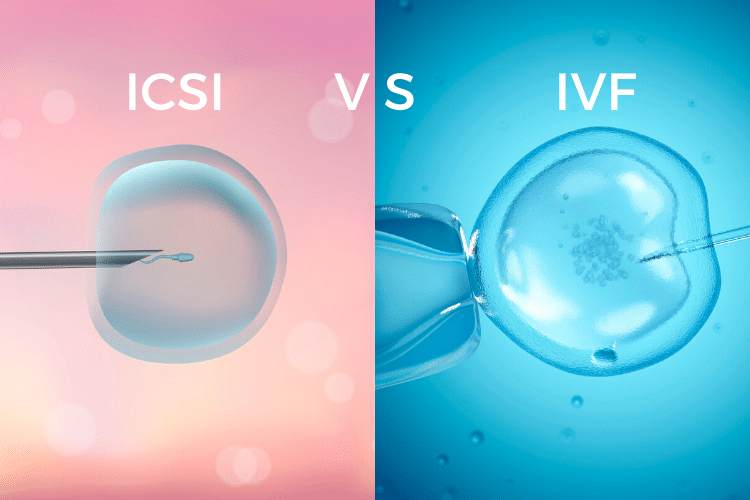In the realm of assisted reproductive technology (ART), two commonly used procedures are in vitro fertilization (IVF) and intracytoplasmic sperm injection (ICSI). Both techniques are designed to help couples overcome fertility issues and achieve their dream of having a child. However, they differ in their approaches and applications.
The Basics
- In Vitro Fertilization (IVF): IVF is a widely practiced ART procedure that involves combining a woman’s eggs and a man’s sperm outside the body, typically in a laboratory setting. The fertilized eggs, or embryos, are then carefully monitored for development before one or more are selected for transfer into the woman’s uterus.
- Intracytoplasmic Sperm Injection (ICSI): ICSI is a specialized form of IVF used when male infertility issues are present. In this procedure, a single sperm is directly injected into a mature egg to facilitate fertilization. This is a more precise method that can overcome sperm-related challenges.
Indications
- IVF: IVF is used for a variety of infertility issues, such as fallopian tube damage or blockage, endometriosis, unexplained infertility, and male infertility. It is also used for cases where the cause of infertility is unclear.
- ICSI: ICSI is primarily used when male factor infertility is the main issue. This can include low sperm count, poor sperm motility, or sperm with structural abnormalities. ICSI is also employed in cases where previous IVF attempts have failed.
The Fertilization Process
- IVF: In traditional IVF, a dish containing the eggs and sperm is placed in an incubator, and fertilization occurs when the sperm naturally penetrates the egg’s outer membrane. The fertilization process depends on the ability of the sperm to penetrate and fertilize the egg on its own.
- ICSI: ICSI is a more controlled procedure. It involves the direct injection of a single, healthy sperm into the egg using a tiny, specialized needle. This bypasses many natural barriers and ensures fertilization, even in cases of severe male infertility.
Success Rates
- IVF: The success of IVF largely depends on various factors, including the woman’s age, the cause of infertility, and the quality of the embryos. Success rates can vary significantly, with younger women generally having higher success rates.
- ICSI: ICSI can be highly effective in overcoming male infertility issues. The success rates are generally comparable to or slightly higher than traditional IVF when it is appropriately indicated.
Cost
- IVF: IVF is generally less expensive than ICSI, making it a more accessible option for many couples. However, costs can still add up significantly, especially if multiple cycles are required.
- ICSI: ICSI is more costly due to the additional laboratory techniques and expertise involved in the procedure. Couples who require ICSI may need to budget for higher treatment costs.
Conclusion
IVF and ICSI are both valuable tools in the world of assisted reproductive technology, helping couples with fertility challenges realize their dreams of parenthood. While IVF is a versatile and commonly used technique, ICSI provides a solution for specific male infertility issues and has proven to be highly effective in such cases. The choice between these two methods should be made in consultation with a fertility specialist, taking into consideration the specific circumstances and needs of the individuals involved. Ultimately, the goal is to select the approach that offers the best chances of success and the greatest hope for building a family.





